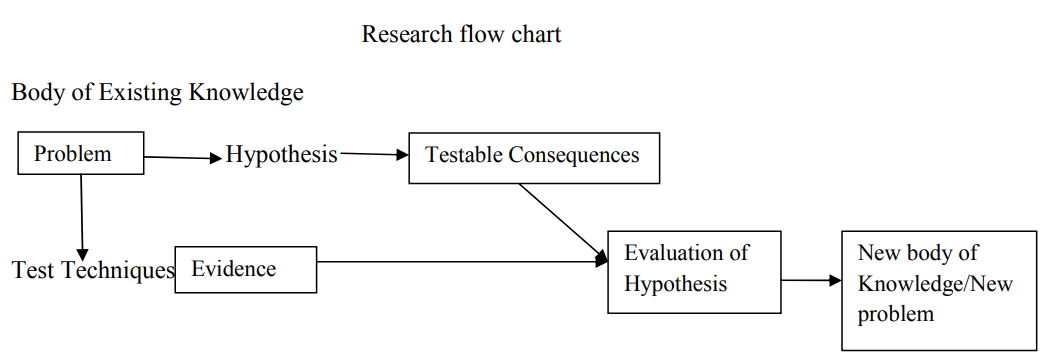
Research methodology refers to the systematic framework that guides researchers throughout the research process.
It encompasses the overall strategy for collecting, analyzing, and interpreting data in a way that ensures the validity and reliability of the research findings.
Essentially, it’s the roadmap that navigates you from formulating your research question to drawing insightful conclusions.
The flowchart below depicts the criticality of the research methodology as it involves testing the hypothesis and techniques used, and finally evaluating the hypothesis with credible evidence to ensure that the research is worthy of adding value to the field of study.

Research Methodology In Action
Here’s a closer look at the key components of research methodology:
Common choices include
Survey Research: Explores the opinions, attitudes, or behaviors of a large population sample through questionnaires or interviews
Mixed Methods Research: Combines quantitative and qualitative research methods to gain a more comprehensive understanding of a phenomenon.
Once you’ve chosen your research design, you need to determine how you will collect the data. Some common data collection techniques include
Knowing the research question and the type of data you need to answer it is crucial for selecting the most appropriate research design.
Interviews: structured or unstructured conversations with participants to gather in-depth qualitative data.
Questionnaires: Standardized surveys are administered to a large number of participants to collect quantitative data.
Observations: systematic observation of participants or phenomena in their natural setting.
Document Analysis: Examining existing documents (e.g., historical records, medical reports) to gather data.
The chosen data collection technique should be aligned with your research design and provide reliable data to answer your research question.
After collecting data, it needs to be organized, analyzed, and interpreted. The specific method of analysis depends on the type of data collected and the research design.
For quantitative data, statistical analysis techniques are often used, while qualitative data might be analyzed through thematic analysis or narrative analysis.
Responsible research prioritizes ethical conduct. Research methodology ensures that ethical guidelines are followed throughout the research process, protecting the rights and well-being of participants.
This includes obtaining informed consent, maintaining participant confidentiality, and ensuring data security.
These key components of research methodology work together to guide researchers through each step, ensuring a well-structured and reliable research endeavor.
A well-defined research methodology is essential for composing effective research papers, dissertations, and more. Besides, 82% of researchers believe that a well-defined research methodology is crucial for ensuring the credibility of their research (Source: Survey conducted by the AAAS).
Moreover, a research methodology:
Provides a Framework: Research methodology acts as a roadmap, guiding researchers through each step of the research process. It ensures a clear and logical progression, minimizing ambiguity and potential pitfalls.
Ensures Accuracy and Reliability: By establishing a structured approach to data collection and analysis, research methodology minimizes bias and errors. This leads to more accurate and reliable findings that can be confidently used to draw conclusions.
Enhances Credibility and Trustworthiness: A well-defined research methodology fosters transparency and replicability. It allows other researchers to understand how the research was conducted and potentially replicate the study.
This strengthens the credibility and trustworthiness of the research findings, making them more impactful.
Facilitates Meaningful Interpretation: Research methodology guides researchers in making sense of their data. It helps them identify patterns, trends, and relationships that might not be readily apparent. This allows for a more nuanced and insightful interpretation of the research findings.
Without a robust research methodology, research can become haphazard and prone to bias, leading to unreliable and potentially misleading results.
Research methodology is the foundation for building strong and impactful research projects.
Let’s explore how research methodology is applied in action across different disciplines:
Marketing Research: A marketing team conducting a survey might choose a quantitative research design and use questionnaires to gather data on consumer preferences for a new product. They would then employ statistical analysis techniques to identify trends and make informed decisions about product development and marketing strategies.
Scientific Research: A scientist studying the effects of a new medication might utilize an experimental research design. They would define a control group receiving a placebo and an experimental group receiving the new medication. By meticulously following research methodology guidelines for this design, they can isolate the effect of the medication and ensure reliable conclusions about its efficacy and safety.
Social Science Research: A sociologist researching the impact of social media on teenagers’ mental health might use a mixed-methods approach. They could conduct interviews with teenagers to gather qualitative data on their experiences and social media usage patterns.
Additionally, they might employ surveys to collect quantitative data on mental health symptoms among teenagers. Combining these methods provides a more comprehensive picture of the complex relationship between social media and mental health.
A methodology provides the principles and a system of methods and principles for carrying out research, executing a process, or teaching something. Most methodologies are unique to their specific topic.
The methodology of a research paper exhibits the entire research process. This depiction helps readers to analyze the approach applied and whether it is accurate and dependable, and if it is relevant to a solution they may be seeking.
Research methodology is often referred to as the “unsung hero” of research. While it might not be the first thing that comes to mind when we think about research, its importance cannot be overstated.
By providing a clear framework and promoting responsible research practices, research methodology is the foundation upon which successful research projects are built.
Whether you’re a seasoned researcher or just embarking on your first research endeavor, understanding and applying research methodology is crucial. It empowers you to design a robust study, collect and analyze data effectively, and draw meaningful conclusions that can contribute to your field of knowledge.
So, embrace the power of research methodology and pave the way for a successful research journey!